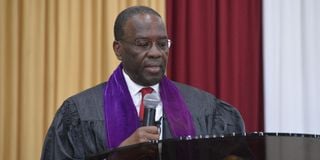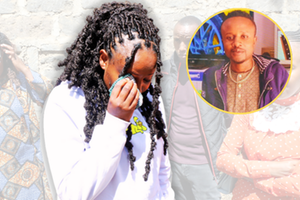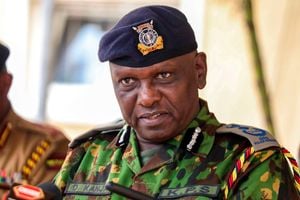Willy Mutunga: Allow open-book exams and academic freedom in universities

Former Chief Justice Willy Mutunga delivering his inaugural lecture Kabarak University on Friday, January 28, 2022.
Professor Willy Mutunga’s lecture was an irony of sorts considering that he did so at the university founded by the man who detained him for months on allegation of dissent for his leadership of the University Staff Union which had been banned alongside the Civil Servants Union by President Moi in 1980.
-------------
Former Chief Justice Willy Mutunga has made a case for open-book examinations in the teaching of law at universities, describing it as liberal and one that enhances academic freedom scholarship.
According to Prof Mutunga, the approach, combined with the Socratic method of teaching enhances collective intellect and shuns individualism and competition for marks, which is rampant in universities, arguing that “education is the mother of all rights”.
The former CJ, who was last year appointed an adjunct professor of public law at Kabarak University said that he was first acquainted with the methodology while studying law at the then University of East Africa, Dar es Salaam during the early 1970s.
“This methodology requires serious reading of the materials to be able to navigate through them for references in an examination that was three hours long,” he said when he delivered his inaugural lecture at Kabarak University.
The title of the lecture was: In search and defence of radical legal education: a personal footnote. It was the first inaugural lecture at the university that was founded in 2000 by former president Daniel Arap Moi. The Kabarak School of Law was launched on June 20 2010. Professor Mutunga’s was the third inaugural lecture in the history of law schools in Kenya.
An inaugural lecture is a great occasion in the career of a scholar when they crystalise their decades of scholarship and present them publicly and in a flowery manner.
Not for crammers
“Inaugural lectures are accorded in high esteem in epistemic communities across the globe. It combines dexterity of thought, the skills of wordsmith tried and tested by decades of intellectual debate and controversy,” Prof John Osogo Ambani, the dean of the School of Law said in his introductory remarks.
The occasion also served as the launch of the content of the lecture which became the first publication of the Kabarak University Press. It has been published as an occasional paper.
“Open-book examinations made sense to me because professors teach from their notes, as do practising lawyers who carry their notes and authorities to court. Crammers and those who prided themselves with photographic memories did not like this methodology,” he said. “Academic freedom births the battle of ideas in the academy, a fundamental reason why universities exist,” he added.
Prof Mutunga said that studying law, which has given him a successful career, ending up serving as Kenya’s head of the Judiciary, was not his first choice field of study growing up.
“I wanted to read history, a subject I loved. Well, I ended up going to Dar to read law because I wanted to travel outside Kenya, and read a discipline that was new. I also knew that there were not many Africans on the Bench and in the legal profession. The argument about a bright professional future in the law must have influenced me, too,” he said.
Prof Mutunga applied the methodology when he joined the University of Nairobi as a lecturer in 1974. He revealed that the new approach, which he considers ‘democratic’ and a ‘battle of ideas’ was at first resisted but also caused much excitement among the students.
“I allowed students to interrupt me and ask questions during lectures. My thought process was not interrupted as conservative lecturers invariably say to avoid exposing their intellectual laziness and arrogance. When I did not have answers I said so and went to do research on the issue and gave my answers. When students critiqued me, I welcomed the criticism and debates ensued. The participation by students enriched our collective intellect in the study of the law,” Prof Mutunga said.
He attributes the radical teaching, activism and radicalism of students and lecturers of the time from the departments of literature, political science, sociology, history, and engineering to the agitation for democratic space in the 1970s and later 1980s.
For their troubles, radical students and lecturers faced the wrath of the state that saw many of them detained. Prof Mutunga’s lecture was an irony of sorts considering that he did so at the university founded by the man who detained him for 16 months (June 10 1982 to October 20 1983). He was detained on allegation of dissent for his leadership of the University Staff Union which had been banned alongside the Civil Servants Union by President Moi in 1980.
Several other lecturers and students were also detained or exiled. Following his detention, Mutunga was sacked by the University of Nairobi where he was teaching commercial law and sale of good and hire purchase law.
Freedom of thought
“Blatant and open intimidation happened before the crackdown when Special Branch officers sat in lectures without registration as students! Some got student cards from the administration when lecturers and students challenged their presence in classes!” he said.
The law scholar adds that his detention strengthened his resolve to resist any attempts of his freedom of thought, opinion, politics, and ideology. He has been involved in the human rights movement in Kenya and advocacy for reforms, social justice and constitutionalism for many years, in addition to practising law.
“I regard my involvement and experiences in the movements that law sees as non-legal phenomena as critical to the search and the defence of radical legal education,” he said.
Prof Mutunga also attributed his achievements and academic trajectory to influences of revolutionary thinkers such as Prof Walter Rodney (who was at Dar es salaam when Mutunga was a student), Che Guevara, Prof Issa Shivji, Prof Sol Picciotto, Prof William Whitford, Prof Robert Siedman and also Prof Yash Pal Ghai. He studied at Dar es Salaam when Tanzania was called ‘the Mecca of Revolution’.





